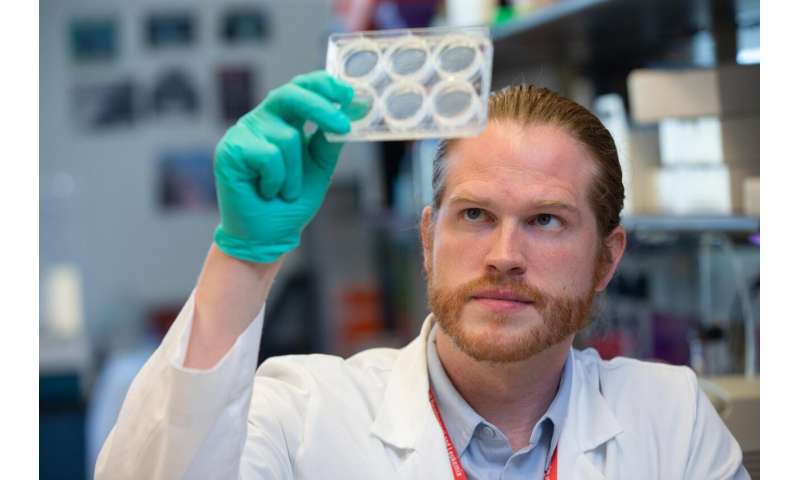Researcher studies combination therapy to improve leukemia treatment

The University of Cincinnati Cancer Center's Eric Vick, MD, Ph.D., has been awarded a nearly $215,000 Career Development Award from the Leukemia and Lymphoma Society (LLS) and a $50,000 American Society of Clinical Oncology (ASCO) Young Investigator Award to continue research into a combination therapy treatment for acute myeloid leukemia (AML).
A protein called IRAK4 is known to help drive AML cell growth through overactivation, but targeting this protein alone has not proven to be an effective treatment for killing the cancer cells. Research Vick presented at the American Society of Hematology annual meeting last December looked at potential compounds to pair with drugs that target IRAK4 as a more effective combination therapy.
"After you have combined the loss of IRAK4 with different pharmacologic agents, you create a situation that is lethal for the cells," said Vick, instructor in the Division of Hematology/Oncology in UC's College of Medicine and a UC Health attending physician at the Cancer Center's Blood Cancer Healing Center.
After testing more than 2,800 small molecules to compare their effectiveness in killing both normal AML cells and those that did not have overactive IRAK4, Vick and colleagues found one compound was especially effective at killing AML cells by reducing the levels of a different protein, called c-Myc, that also drives cancer growth.
"We see that IRAK4 inhibition or deletion has a unique role in decreasing the lifespan of c-Myc. By combining it with different compounds, we can decrease the amount of c-Myc and, by doing so, decrease cell growth in leukemia," Vick said. "A major focus of this grant will be understanding how IRAK4 inhibition decreases c-Myc."
The three-year LLS grant will allow Vick to further his research and describe in more detail exactly how targeting IRAK4 affects c-Myc. The one-year ASCO grant will increase the team's bandwidth and include the study of additional potential compounds to use in the combination treatment.
"c-Myc has been described as untargetable, and there are many groups who have tried to target this protein without clinical success," Vick said. "Our hope is that by understanding how IRAK4 targets c-Myc, we can indirectly lead to a loss of c-Myc. This may be the only way to target something ubiquitous and essential to normal cellular processes, but at the core of so many malignancies."
With this additional knowledge, the ultimate aim of this grant funding is to move the research from observation in the lab to intervention in the clinic through a trial testing combination therapies targeting IRAK4 and c-Myc. Vick and colleagues will also investigate other diseases with similar protein mechanisms that could benefit from the same proposed treatment.
Vick worked as a clinical fellow in Daniel Starczynowski's lab at Cincinnati Children's Hospital prior to joining UC's faculty, and he is continuing the LLS grant-funded research in the Starczynowski lab. Starczynowski said Vick has shown exceptional dedication to his work and a passion for advancing the understanding of blood cancers.
"Over the course of his time in the lab, I have seen him grow not just as a researcher but also as a leader," said Starczynowski, Ph.D., associate director of Cincinnati Children's Cancer and Blood Diseases Institute, associate director for basic science research at the University of Cincinnati Cancer Center and a professor in the Department of Pediatrics in UC's College of Medicine. "He has developed a remarkable ability to approach complex scientific questions with creativity and rigor while also mentoring younger members of our team. His collaborative spirit and willingness to tackle challenges head-on have made him an invaluable asset to our research efforts."
Vick said he is thankful for the support he has received to help him grow as an early-career investigator.
"I am exceedingly grateful to my mentors Dan Starczynowski, John Byrd and Emily Curran; Cincinnati Children's; UC; and the members of the Star Lab, without whom none of this would be possible," he said. "The LLS Career Development Program is an incredible honor — career-defining — and was also validating as a very new physician scientist."
Starczynowski noted the LLS Career Development Award is a significant achievement for early-career blood cancer researchers, both in providing crucial funding to further their work and as a strong endorsement of their potential.
"For Dr. Vick, this award is a testament to the impact he has already made in leukemia research and the promise he holds as a physician-scientist," he said. "It highlights his innovative approach to tackling some of the most challenging problems in cancer biology and positions him well for future successes. I have no doubt that Eric will continue to make significant strides in his career, benefiting both patients and the scientific community."
Provided by University of Cincinnati